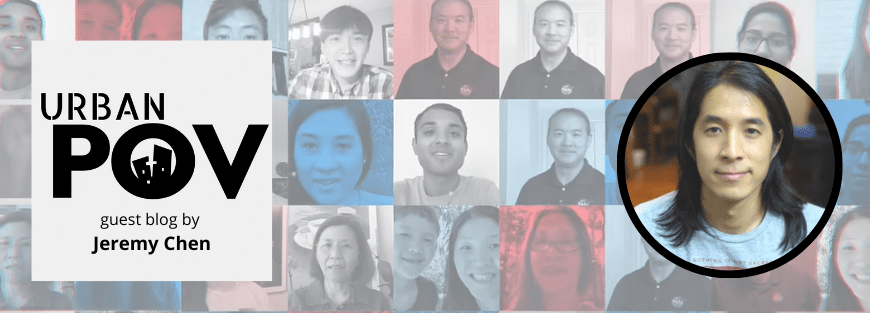Embracing AAPI Stories in the Journey of Empowerment
Posted by: DVULI | May 26, 2021

On March 16, 2021, mass shootings occurred at three spas in Atlanta, Georgia. Eight people were killed, six of whom were Asian women. When the news went viral, I immediately knew it would go down as a significant moment in history.
Somehow, I couldn’t get myself to read through the stories as they popped up on my newsfeeds. I pushed them to the side to avoid being overwhelmed. It would be several days before I began to process this massacre and allow my inevitable mess of emotions to unravel.
By the time I read the news stories, a flood of physical sensations, thoughts, feelings, and internal reactions (that I couldn’t put into words) tore me open. At first, I felt shame because I had delayed processing and exposing myself to the horrific realities.
One story at a time centered on people of Asian heritage and the precious humanity of those lives that had been stolen. As an Asian American (Chinese-Taiwanese background), I felt each news headline viscerally. I imagined my fragile grandparents targeted for hate crimes, and it made me weep. It seemed like the rest of the world reacted in a way that just left us surviving Asian Americans to quietly suck it up as we always do and to find our own internal strength to push through with no need to grieve.
After the death of George Floyd, my gut reaction was to raise my voice and challenge my Asian and Asian American Christian community to honestly reckon with our own racism against Black Americans and repent for our biases and sin.
Prior to that event, I had always avoided being eagerly drawn into politicized topics. But when the recent anti-Asian xenophobia began to yield a string of brutal incidents in urban centers around the US, I felt at a loss. Still, I knew I would need the help of my fellow Asian American brothers and sisters to grieve.
As uncomfortable as it felt, I decided to take up space and eschew any remnants of engrained “model minority” perfectionism. Throwing my own socialized caution against emotive vulnerability, I recorded a series of unfiltered and unscripted video conversations with Asian American friends. This allowed us to process the aftermath of the Atlanta massacre as Asian Americans.
Recording 11 conversations (playlist: rebrand.ly/processingasianhate) with various friends, our processing felt therapeutic. Besides helping address the complexities of our own identities as Asian American Christians, the talks created a safe space for our stories and our perspectives to be heard by others.
Those conversations taught me how opaque Asian Americans are to ourselves and our stories. We have a long way to go if we’re to come to terms with who we are as Asian Americans in the broader cultural, ethnic, and racial landscape in the US.
The Asian American Pacific Islander (AAPI) umbrella label houses a great amount of diversity. Twenty million of us trace our roots to more than 20 countries, coupled with the broad range of immigration experiences, income levels, religions, languages, and more.
So, yes, that is a lot of complexity, narratives, and identities to unravel. And perhaps because I subconsciously was aware of how complicated it all is, in the past, I had left my own identity on the sidelines to engage in predominantly black and brown ministry spaces. But, no more!
I have come to see that an increasing self-awareness of our own stories gives greater capacity to serve as cultural ambassadors who can more skillfully invite others into the richness of our contribution to the cultural tapestry of God’s kingdom. Over time, sharing our unique stories helps weave together a more beautiful story in the overlap of our respective cultural stories.
With external and internal pressures rewarding AAPI citizens for culturally assimilating, many second-generation Asian Americans identify more with the American culture in which we were raised than with the culture of our first-generation immigrant parents.
Together, my peers and I identified a gap in our social engagement and consciousness as being connected to a greater need for emotional self-awareness and a gap in our historical consciousness about the stories of our people. When we begin to process our racial identity, we feel unmoored and disoriented. We feel we occupy this hard to describe, liminal space of “in-between-ness,” and that’s just the beginning of the complexity.
There are also the ambiguities of silence—a silence of being left out, marginalized, exoticized, taken advantage of, and at times, violently oppressed. We have often become unsure of how to find our own voice, unconfident in expressing our pain and practicing lament alongside our siblings in Christ of other ethnic/cultural backgrounds, struggling to lean forward by the Spirit in hope. As daunting as it may be to process these matters, we must move forward by faith.
How does processing AAPI stories relate to the youth ministry work? If we see our roles of serving young people in urban contexts as a matter of holistically partnering with Jesus to help them discover how their rich stories connect to Jesus’s story, consider this perhaps disorienting process of attending to AAPI experiences as an exciting, breathtaking, and hopeful journey toward empowering young people to follow Jesus into a world of cultural diversity.
As youth grasp for tools to find their bearings amidst increasing complexity, they won’t find comfort in oversimplified, generic perspectives on faith. It will rather be the particularity of culturally embedded, historically shaped perspectives (including from the AAPI experience) that will convince them that Jesus, the first-century Palestinian Jew, is indeed the Lord of the universe and worth giving everything up to follow.
In the process, and as leaders, we’ll discover new dimensions of what our treasured DVULI core values of interdependence, empowerment, and accountability mean as we fumble our way toward the beauty and joy of breakthrough.

